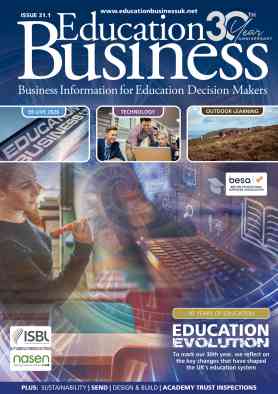Unlocking teacher talents
 Education’s eternal embarrassment is that the same standards of professional learning expected for our children in classrooms are not applied to teachers themselves. It is baffling that the educators we entrust to nurture pupils are not adequately developed as professionals in the complex craft of teaching. This is after all one of the hardest jobs in the world. After a lifetime of study the American education psychologist Lee Shulman concluded that teaching is “perhaps the most complex, most challenging, and most demanding, subtle, nuanced, and frightening activity that our species has ever invented.”
Education’s eternal embarrassment is that the same standards of professional learning expected for our children in classrooms are not applied to teachers themselves. It is baffling that the educators we entrust to nurture pupils are not adequately developed as professionals in the complex craft of teaching. This is after all one of the hardest jobs in the world. After a lifetime of study the American education psychologist Lee Shulman concluded that teaching is “perhaps the most complex, most challenging, and most demanding, subtle, nuanced, and frightening activity that our species has ever invented.”
Major studies have confirmed what we all intuitively know: the quality of teaching is by far the biggest factor within schools impacting on the learning and achievement of our children. It is particularly powerful for children from disadvantaged backgrounds. A Sutton Trust review found that over a school year, poorer pupils gain 1.5 years’ worth of learning with very effective teachers, compared with 0.5 years with poorly performing teachers. In other words a good teacher can produce a whole year’s extra learning. In the world of education that’s a huge difference.
Just ask Andreas Schleicher, the OECD’s education expert, who has seen more of the world’s education systems that anyone else on the planet. Schleicher believes that a focus on professional learning and development for teachers has been the ‘number one’ factor distinguishing high performing education nations from the rest. It is the reason that countries like Singapore and Shanghai have shot up the international leagues tables. To their loss, the UK and US, in his view, have failed to recognise this key insight.
Teacher time
One of the simple reasons is that teachers on both sides of the Atlantic are so busy that little time is freed up to improve their practice. This year the OECD reported the latest results from its Teaching and Learning International Survey (TALIS) which compares teachers in 30 different countries. Teachers in England spend 46 hours a week doing their job – nine hours more than the median for all countries of 37 hours. That equates to nearly two hours extra per working day. Their US colleagues face the same long workloads.
Yet teachers in many of the high performing nations report a far smaller teacher workload. What is also striking is the extra time devoted in these nations for teachers to pursue professional learning through collaborative observation and feedback. In Singapore for example, 250 hours of teacher time a year is dedicated to professional development – far more than in the UK or US.
It is not just quantity but quality that is a problem. Many teachers, at least in England, are sceptical about how useful current continuing professional development (CPD) is. In TALIS, only half thought it improved their practice, a low figure by international standards. Just 45 per cent of English teachers meanwhile reported CPD involving ‘working with a group of colleagues.’ Too much CPD comprises one-off sessions with dry external experts rather than active learning with fellow colleagues on targeted problems.
The uncomfortable truth for educators is that little has been done to share what appears to be the best approaches to teacher learning. There is scant robust evidence of what actually works whether it is how to observe colleagues, to provide meaningful feedback or to help change the practice of fellow teachers for the better.
Insights from research
There are however some general insights that have emerged from the research: first, the best professional learning programmes for teachers should involve multiple approaches for providing feedback (selected from the seven listed in the panel on this page); second, it is critical that teachers are properly trained as observers; and third, observations and feedback for professional learning should be a parallel and separate process to appraisals for performance management.
One of the difficulties for teacher observation, however, is that it is deceptively hard to observe what good or great teaching actually looks like in the classroom. In his blog ‘Classroom observation: it’s harder than you think’ Durham University’s Professor Rob Coe spells out the many easy assumptions and traps observers fall into. Because learning is invisible, those trying to detect good classroom practice resort to using proxies for student learning, including students seeming busy or engaged and motivated. Professor Coe urges teacher observers to be acutely aware of these limitations. At the very least teachers should be trained in the practice of observation and feedback.
School leaders use frameworks that define the components of good teaching such as Danielson’s Framework for Teaching or national standards or develop their own expectations with colleagues. However, the lists used to describe good teaching practice are so broad as to be at best crude diagnostic tools. All teachers agree that you need to plan and prepare lessons and engage students in their learning.
The key, however, to diagnosing good teaching is to uncover in detail how well they are doing all the myriad things that make up teaching practice, and indeed how they are deciding what things are best to do when and for whom. It is this ‘executive function’ – knowing what to do and when – that marks out the truly great teachers. But it’s hard to quantify this attribute in some simple criteria.
Given all this, it is perhaps unsurprising that the biggest ever study on teacher evaluation, the Measures of Effective Teaching Project (MET), revealed that even the very best observation approaches had limited success in identifying the teachers also associated with the highest gains in pupil attainment.
Those scrutinised in the MET study were the very best observation frameworks – using respected teaching frameworks like Danielson’s and proper training for observers.
The MET study confirmed the need for multiple sources of feedback and training but has also added to the conviction that the trust needed for observation and feedback to develop teachers means it should be clearly divorced from evaluations that centre on their performance management.
Five principles for practice
One of the most comprehensive reviews of research in this area has been undertaken by New Zealand academic Helen Timperley (whose work is referenced extensively by John Hattie, among others). She offers at least five specific principles for schools to make professional learning strategies effective. The strategies must focus on and be measured against student outcomes and encourage ‘self-regulation’ among teachers who need to embrace the experience as independent learners and sustain the techniques. Input is required from school leaders as well as, ideally, collaboration with peers. The strategies should also pose a genuine challenge.
What is striking about the ‘professional learning cycle’, based on Timperley’s work and used by some schools in Australia, is that it resonates so much with what we know about feedback loops for dialogue between teachers and children. Closing or completing these loops is key to actually changing practice of teachers following feedback – all too often a failure of most programmes.
Practical tips
These insights, useful as they are, do not offer the practical strategies and tools that school leaders and teachers have found to be successful and would love to share with others to improve observation and feedback in schools.
Some insights we hope will be revealed by evaluations we are carrying out at the Education Endowment Foundation. One study is assessing the impact of Lesson study, a collaborative peer observation programme created in Japan but currently much in vogue in English schools. Another study will assess the impact of different frequencies of observations on teachers and whether teachers trained as observers also improve their own classroom practice.
But with such little research evidence available what wisdom can we gather from teachers and school leaders who actually develop and deliver successful professional learning in the complex, challenging, demanding, subtle, nuanced, real world of teaching? This is exactly the question at the heart of an international summit the Sutton Trust is organising in partnership with the Bill & Melinda Gates Foundation.
To be held over two days in early November 2014 in Washington DC, the summit will bring together 80 school leaders and teachers from a range of countries including the UK, US, Canada, Australia, Finland, Holland, Singapore and Hong Kong. The participants will hear the latest research evidence on professional learning. But just as importantly they will bring with them their practical tools and strategies for observation and feedback that will benefit other school leaders and teachers around the world.
The aim will be to create a practical guide for the effective professional learning of teachers that is currently so conspicuous for its absence.
Further information
www.suttontrust.com
Latest News
26/01/2026 - 10:40
The proposed Scottish Budget for 2026-27 commits up to £200 million to the Scottish Attainment Challenge.
26/01/2026 - 10:24
The Welsh Government has set out the key challenges facing tertiary education in Wales and has launched a call for evidence to help address these challenges.
23/01/2026 - 10:47
Almost half (45%) of school leaders needed mental health and well-being support in just a year, a new survey from union NAHT has found.
22/01/2026 - 10:44
The film, ‘The Lunch They Deserve’, seeks to focus the nation on the need for better school food standards before the provision of Free School Meals is extended.
21/01/2026 - 11:24
Speaking at the Bett UK Conference, the Education Secretary said the EdTech Testbed will recruit schools and colleges to put the latest tech and AI tools through their paces.







